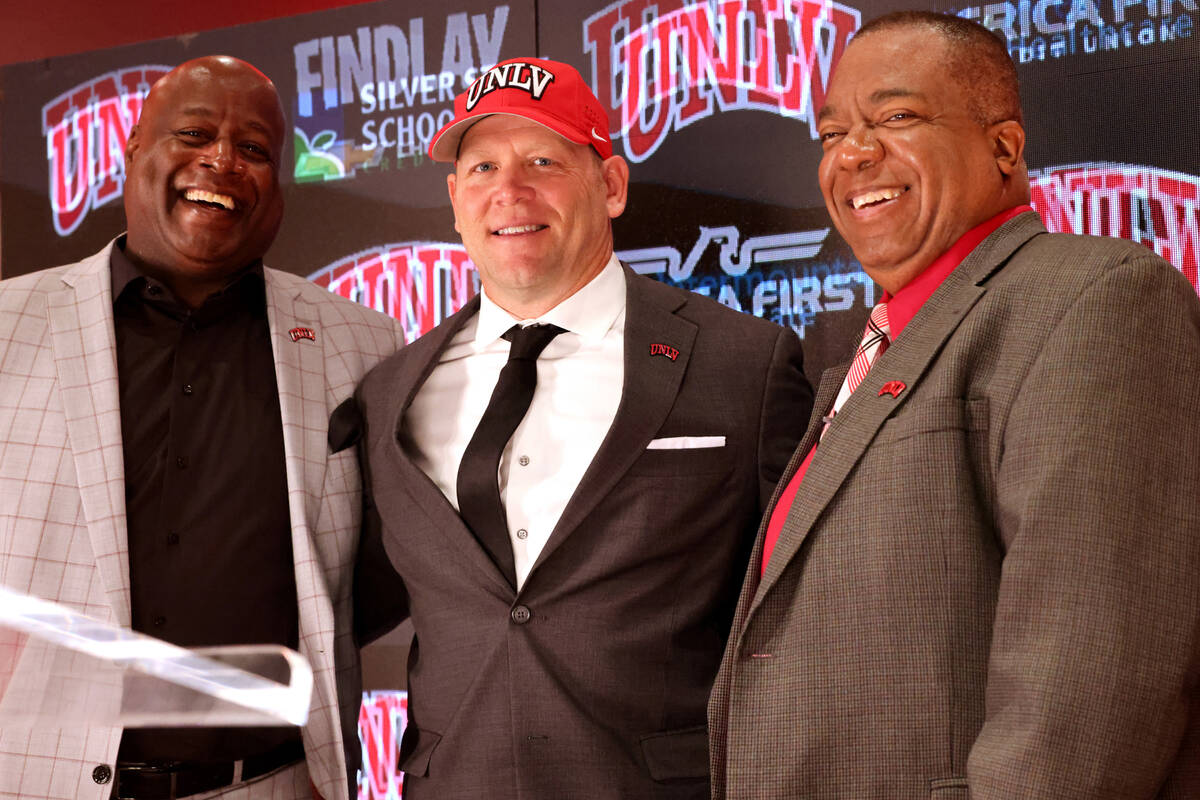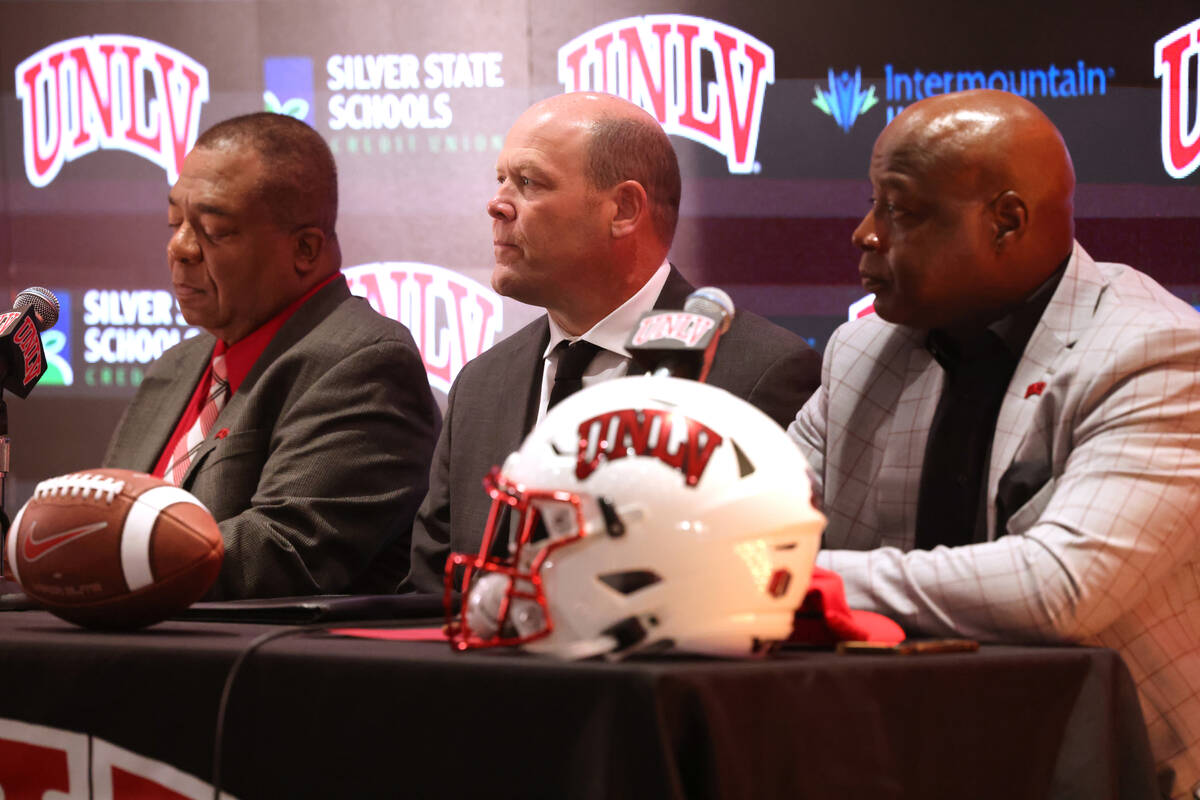Q&A: UNLV president, athletic director explain decision to stay in MW
UNLV president Keith Whitfield and athletic director Erick Harper spent a lot of time together this week pondering the future of the university’s sports programs.
They settled on a deal that will keep the school in the Mountain West in exchange for accepting a hefty signing bonus and favorable incentives to stay out of the Pac-12.
An influx of cash to the athletic department and a louder voice in the room in terms of the direction of the conference could help position UNLV closer to its ultimate goal of a Power Four conference invitation.
Whitfield and Harper spoke with the Review-Journal on Friday to break down the process that went into accepting the deal. Here is some of the conversation about the process of negotiations that ended with UNLV re-committing to the Mountain West and what it means for the institution:
RJ: When the dominoes started to fall Sept. 12 with four schools abruptly leaving the conference, what was your guiding principle and your goals in terms of what you wanted to accomplish for your athletic programs in deciding between the Mountain West and the Pac-12?
KW: Yeah, that’s interesting because it’s almost two intersecting things. One is actually the conference that you play in, and then the other is the direction that we as an athletic program are actually taking under the leadership of Erick Harper.
For the conference piece of it, it was to just deal with and try to manage what’s going on relative to realignment that has happened over the last two years to virtually every conference or a little bit from each conference, and to figure out where the Mountain West was going to be able to stay strong. It’s a good brand, was a good collection of schools that really represented a good smattering of the west, which is now kind of interestingly intersected by other conferences that are trying to be countrywide. So there’s that issue.
For us, it really is seeing that the hard work that’s been being done, the very important strategies in terms of hiring outstanding coaches, making sure that we support the student experience, all of those things were there and just saying we need to make sure that wherever we end up at or however we make this decision that those are our priorities, the student experience first and foremost, but making sure that we support our coaches and staff and have something that our community … can be proud of.
RJ: Do you feel like you were able to accomplish those goals with the decisions that were eventually made?
KW: I would say 100 percent. I would say that it really does accomplish that. Part of this, if you take a little half step back, is the investment that’s been being made, very strategic investments being made for practice facilities for supporting our student athletes. And one of the issues that is first and foremost is having hired an outstanding (football) coach who in his first season went to the freaking Mountain West championship. That has got to be a turnaround for the ages.
But the other strategic thing is that when you do well, you have to assume that it’s going to cost you more money. So how do you do that? How do you navigate, negotiate, strategize, plan, make sure that you put in other kinds of ways in which to both generate more revenue and make sure that financial decisions are being made to the best bottom line that can be done. So we do think that that arrangement ultimately does that and does it in a very good way.
One of the things the athletic director really thought of is that because we’re doing so well, because we’re a linchpin in this whole process, and I think the success of either one of those two options that we were given, that he also wanted to say, ‘Hey, we need to make sure that we take care of some of our longer lasting relationships, income streams and such, for the community.’ And part of that is having the Thomas & Mack remain the place where we play the championship (basketball tournaments). I can tell you I’ve got some of my fellow presidents when they want to go someplace else, I say, ‘Man, there’s no better place better than to go to Thomas & Mack.’ So I think that it was an easy thing to negotiate. Although nothing that (Harper) had to do was easy. I think it was really easier because it is an outstanding place for us. It made sense because it connects to our community and it does have long-term financial implications as well. So that just hit on all cylinders.
RJ: What was the most difficult part of the process?
KW: I think I’ll speak for the athletic director in saying it was having to spend hours and hours with his president asking him questions and trying to figure out. (Laughter). It’s funny. In the realm of sports, I think sometimes people think that they know everything. I basically spent three or four days almost from the time that the roosters got up until late into the evening trying to do this. And part of it was for (Harper) to be able to explain it to me. I said, if you can explain it to me, then you can explain it to anybody else.
So I think that that was partly one of the ones that I’ll say is a difficulty for me is that university presidents are not experts at athletics. And what was then interesting about this exercise is that I’ve learned a lot more. I serve as the president of the Mountain West Conference, and I feel even better prepared to be able to help us continue to navigate where the conference is going to go from having gone through this process.
EH: The most difficult part was lack of sleep and also just dealing with my wife and making sure her stress level was down.
RJ: How close was UNLV to going to the Pac-12?
EH: I just evaluated everything that I had squarely down the middle because there’s pros and cons both ways. So I didn’t want to be leaning one way or the other until I truly had all the information available from both sides to navigate through. And that was from phone calls with industry experts and high-level athletic directors, other commissioners, and all the different things that go into a decision like this was important for me to be completely open-minded to what’s going to end up being essentially the best (deal for UNLV and the community).
RJ: How realistic is an eventual Power Four bid for UNLV, and do you believe you are better positioned for that now than two weeks ago?
EH: We’re well positioned because of what coach (Barry) Odom has been able to do in a very short period of time with football. Everything is possible when that occurs. Who knows? Nobody ever thought Houston would be back into an autonomous conference. Nobody thought Cincinnati would be in an autonomous conference. Nobody thought that Central Florida would be in one, but they are.
And so those opportunities are going to present themselves. When? If I had a crystal ball, I’d be able to give you the right answer. But I don’t. So what is important for us, as I’ve said many, many times, is if we don’t take care of home, we don’t get an invitation regardless of realignment. We have to take care of home. And right now, we’re doing a very good job with coach Odom in doing that piece of it on the football side, and we’re looking to take additional steps this year on the basketball side. Lindy La Rocque has women’s basketball squarely in play.
And, as an institution, and I’ll just brag on the president here, since he’s taken over the university our graduation rates have increased, our retention rates have increased and enrollment has increased. So I think we’re doing all the things that we need to do, but it’s now time to double down, not only as a university, as an athletic department, but also as a community to double down on the great things that are going on in Las Vegas.
RJ: In addition to the financial victories and other concessions that were part of the deal to stay in the Mountain West, it appears the school has gained a much bigger voice in conference matters. So what’s next? Where would you like to see the conference go?
EH: We’ve got to add a couple programs, and we’re going to do a very good job of evaluating that over the next, obviously several weeks, several months to determine what’s best for the Mountain West … and also to make sure that those schools that are currently committed to remain in the Mountain West, that we position ourselves very, very well for success, as well as maintaining national exposure.
KW: All the things that Erick just said, it really is about branding or a large piece of what we have been working on is about branding what the Mountain West is really going to be. And one of the things that I think very well aligns us and what partly made this decision feel like a good decision was the idea of focusing on the student experience. … We want clearly our brand to be that we’re really focused on the student experience … and how can we prepare them for whatever’s going to happen for them on the field (and) in their future when their collegiate run is over?
Contact Adam Hill at ahill@reviewjournal.com. Follow @AdamHillLVRJ on X.
























